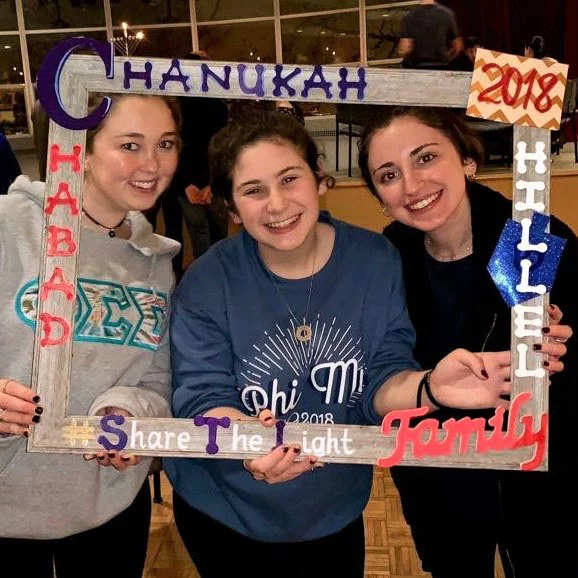Beyond the classroom

The backpack Annie Cannon slung over her shoulder in high school contained the usual books — a math textbook, a science textbook, a tractate of Talmud.
She used to joke that the jumble of secular and religious books in her backpack were a microcosm of Golda Och Academy, ranked the No. 1 Jewish day school in New Jersey.
A graduate of Golda Och, Cannon developed a strong sense of Jewish identity that followed her to Muhlenberg College, where she majors in Judaic studies and elementary education.
“There was a void after we graduated from Golda Och because we were such a close-knit community,” she said. “When we got to college, many of us went searching for a similar community feel. We found it at Hillel.”
The rising junior is one of many Golda Och alumni who have continued their Jewish involvement at Hillel. This year, Cannon, 20, and three of her former classmates rose to the rank of Hillel president on their respective campuses — Muhlenberg College, Barnard College, Brandeis University, Carnegie Mellon University.
“Golda Och is a pipeline for Jewish leadership,” she said. “We learned that it’s not enough to be a participant. We can’t just take from the Jewish community; we have to give back.”
Each of the Hillel presidents said Judaism is a central part of their identity, bolstered by years of Judaic classes that encouraged them to grapple with ancient texts and ask hard-hitting questions.
Lindsay Biebelberg, a history and economics major, said the small class sizes at Golda Och encouraged her to assume leadership roles, ultimately preparing her to serve as president of Brandeis Hillel.
“With just 34 students in our graduating class, we had to become leaders in almost everything we were involved with — class, arts, sports,” she said. “That helped me overcome my stage fright and find my voice.”
Raised in a Conservative-affiliated Jewish community, Biebelberg, 20, didn’t have much exposure to other Jewish movements until she became involved in Brandeis Hillel. The diversity of Jewish students encouraged her to plan a Havdalah service that incorporated traditions from various denominations of Judaism.
“Navigating religious pluralism on campus can be challenging,” she said. “By making compromises, we were able to create a meaningful experience.”
Under the glow of the Havdalah candle, participants strummed on guitars and sang prayers. The program was attended by students who identified as Reform, Conservative, Reconstructionist, Orthodox and non-denominational.
“It can be intimidating to find your place in a large Jewish community,” said Biebelberg, a junior. “I want students to feel welcome and inspired to explore their Jewish identity.”
The welcoming atmosphere at Hillel Jewish University Center led Talia Solomon, who studies biomedical and chemical engineering at Carnegie Mellon, to become involved in Jewish programming as a freshman. She served as education chair and vice president before she was elected president.
In addition to her typical responsibilities as a Hillel leader, Solomon also shouldered an unexpected role: consoling students during times of sorrow.
Solomon, 21, remembers the morning she learned of the shooting rampage at Tree of Life synagogue, less than 1.5 miles away from Carnegie Mellon. She frantically called and texted every Jewish student in her contact list. The rising senior even knocked on the doors of observant students, many of whom frequented synagogues near Tree of Life, before the campus went on lockdown.
Hours later, she partnered with campus leaders to plan a song-filled vigil, which drew 1,500 students, faculty and community members.
Solomon also played a crucial role in leading a paint event at “The Fence,” the unofficial university billboard. Students placed stones atop the fence, adorned with freshly painted Jewish stars, to commemorate the 11 victims of the massacre.
“Our community was so deeply affected and distraught,” she said. “It was our responsibility to help them mourn.”
Noa Shapiro, outgoing president of Columbia/Barnard Hillel, undertook a similar role when tragedy shook her campus community.
She coordinated with Hillel student leaders to organize a vigil, allowing 350 Columbia and Barnard community members to openly grieve together after the shooting at Tree of Life. Barely a month later, Shapiro once again offered comfort and support after anti-Semitic graffiti was found on the walls of a Jewish professor’s office at Columbia Teachers College.
“When people are hurting, they look for community,” said Shapiro, who recently graduated with a degree in classics from Barnard. “Common grief brings people together — even strangers.”
Shapiro, 22, also engaged Jewish students through initiatives such as The Lounge, a coffee-house style performance space for artists. The low-barrier program was a casual way for students to become involved in CB Hillel.
“Our Hillel community is molded by students who chose to invest their time,” she said. I watched as my older friends put in more time, the community became stronger. I was inspired to follow in their footsteps.”
Annie Cannon said Gold Och nurtured her, Shapiro, Biebelberg and Solomon
to become the next generation of Jewish leaders. She wasn’t surprised to learn that they became Hillel leaders at colleges and universities on the east coast, she added.
“When we got to college, joining our local Jewish community was a natural next step,” she said. “Hillel embraces Jewish tradition and change, secular and religious. A lot of us were drawn to that incredible aspect of Hillel because it’s reminiscent of the Jewish values we learned at Golda Och.”